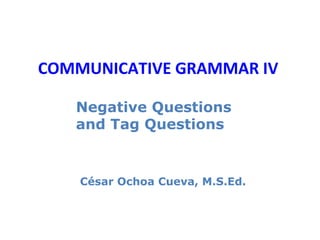
Negative questions
- 1. COMMUNICATIVE GRAMMAR IV Negative Questions and Tag Questions César Ochoa Cueva, M.S.Ed.
- 2. USE Use negative yes/no questions and tag questions to: check information you believe to be true OR comment on a situation. Doesn’t Sue Sue plays golf, play golf? doesn’t she?
- 3. NEGATIVE YES/NO QUESTIONS Like affirmative yes/no questions, negative yes/no questions begin with a form of be or an auxiliary verb, such as have, do, will, can, or should. Haven’t you Can’t you stop eaten lunch eating pizza? yet? Shouldn’t you think Don’t you like about pizza? losing weight?
- 4. TAG QUESTIONS Form tag questions with statement + tag. The statement expresses an assumption. The tag means Right? OR Isn’t that true? She is from Mexico, isn’t she? Tom plays soccer, doesn’t he?
- 5. TAG QUESTIONS If the statement verb is affirmative, the tag verb is negative. If the statement verb is negative, the tag verb is affirmative. Ann isn’t a pilot, is she? They like fast food, don’t they?
- 6. TAG QUESTIONS Form the tag with a form of be or an auxiliary verb, such as have, do, will, can, or should. Use the same auxiliary that is in the statement. You can drive, can’t you? You won’t buy a house, will you?
- 7. ATTENTION In the tag, only use pronouns. When the subject of the statement is that, the subject of the tag is it. Bob isn’t commenting on this, is Bob? he? That wasn’t my pencil, was it?
- 8. ANSWERS Answer negative yes/no questions and tag questions the same way you answer affirmative yes/no questions. He likes ice cream, doesn’t he? Yes, he does.
- 10. Bibliography • Fuchs, M. & Bonner, M., Focus on Grammar 4 Pearson Education , White Plains, NY 10606, 2006 • http://www.myenglishteacher.net • Photo credit: Microsoft Office
